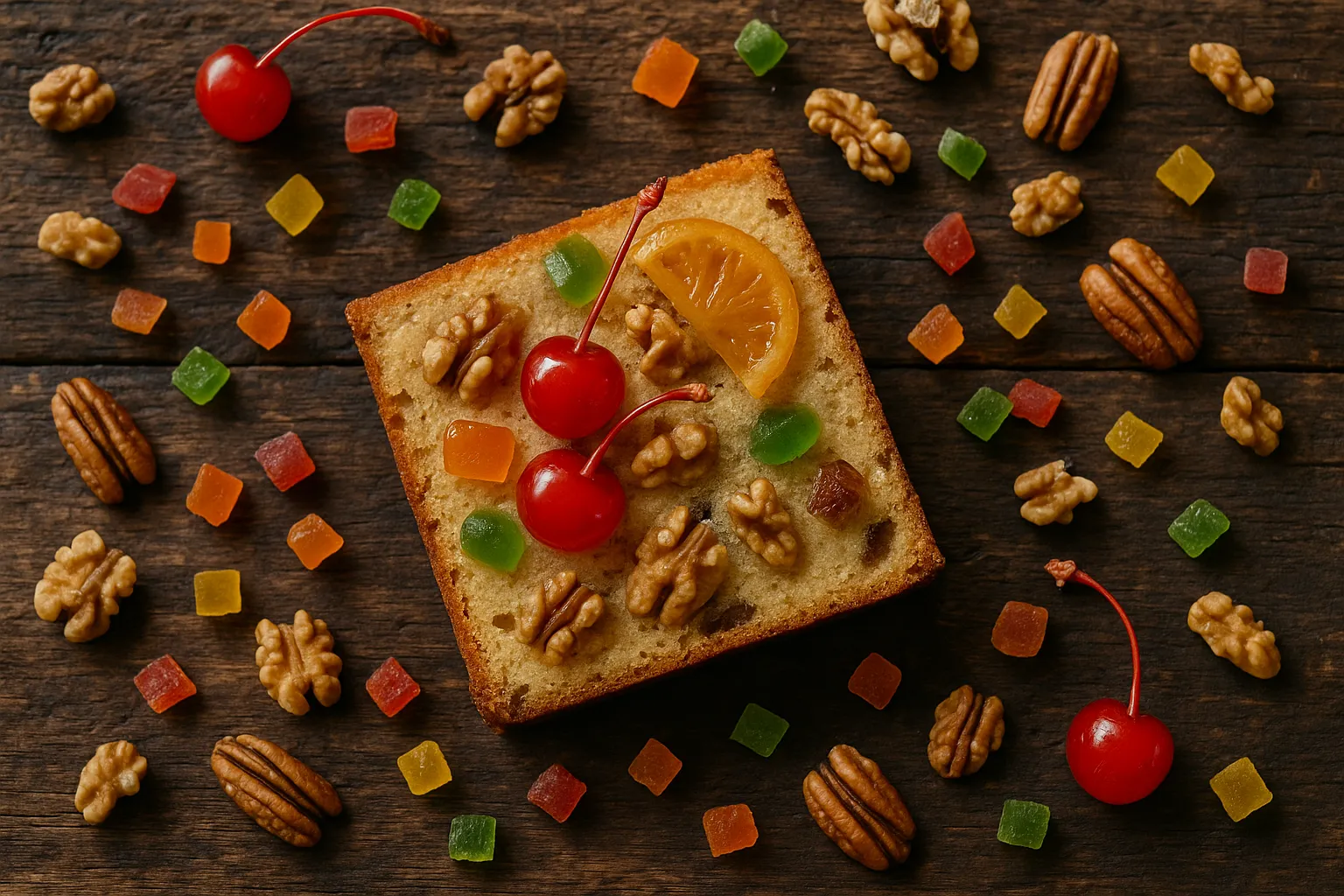Fruit Cake: Calories, Nutrition and Health Benefits
A traditional holiday dessert packed with dried fruits, nuts, and spices—enjoy mindfully for special occasions.
Quick Nutrition Facts
Per 1 Slice (75g)
| Nutrient | Amount |
|---|---|
| Calories | 247 kcal |
| Protein | 2.2g |
| Carbohydrates | 46.7g |
| Fiber | 2.9g |
| Sugars | 20.9g |
| Fat | 7.0g |
| Potassium | 127mg |
| Iron | 1.7mg |
| Calcium | 27mg |
| Vitamin A | 5mcg |
Macronutrient Breakdown

NUTRITIONIST INSIGHT
Fruit cake's nutrition comes primarily from dried fruits providing antioxidants, potassium, and iron. The nuts add healthy fats and protein. Enjoy in moderation—its calorie density makes portion control essential for health goals.
Myth Busters
MYTH #1: Fruit Cake Is Just Empty Calories
TRUTH: While calorie-dense, fruit cake provides nutrients from dried fruits (potassium, iron, antioxidants) and nuts (healthy fats, vitamin E). Dried fruits retain most nutrients of fresh fruits in concentrated form. However, added sugars and fats mean moderation is key.
MYTH #2: Fruit Cake Lasts Forever
TRUTH: Properly stored fruit cake can last 1-2 months at room temperature, 6 months refrigerated, or up to 1 year frozen. The high sugar and low moisture content inhibit bacterial growth, but it doesn't last "forever." Mold growth indicates spoilage—discard immediately.
MYTH #3: All Fruit Cake Contains Alcohol
TRUTH: Traditional recipes may include brandy or rum for preservation and flavor, but many modern versions are alcohol-free. Check labels or recipes. Alcohol-soaked versions should be avoided during pregnancy, by children, and those avoiding alcohol.
MYTH #4: Fruit Cake Has No Nutritional Value
TRUTH: A 75g slice provides 2.9g fiber (11% DV), iron from dried fruits, vitamin E from nuts, and antioxidants from candied fruits. While not a health food, it offers more nutrients than many processed desserts when made with quality ingredients.
MYTH #5: Homemade Is Always Healthier Than Store-Bought
TRUTH: Not always. Homemade allows control over ingredients and sugar levels, but many recipes use excessive butter and sugar. Commercial versions may use corn syrup and preservatives. Read labels and compare recipes to choose wisely.
MYTH #6: Fruit Cake Is a Good Breakfast Option
TRUTH: With 247 calories and 21g sugar per slice, fruit cake lacks protein needed for sustained morning energy. It causes blood sugar spikes without the protein-carb balance of a healthy breakfast. Save it for occasional dessert, not daily breakfast.
NutriScore by Health Goals
| Health Goal | NutriScore | Why This Score? |
|---|---|---|
| Weight Loss |  | High calorie density (329 kcal/100g) with added sugars. If consumed, limit to 40-50g portions, eat in the morning, and account for calories in daily budget. |
| Muscle Gain |  | Low protein (2.2g per slice) makes it suboptimal. Can provide quick energy post-workout, but pair with protein shake or Greek yogurt. Nuts add some healthy fats. |
| Diabetes Management |  | Moderate-high GI (68) with concentrated sugars. Eat small portions (40-50g), pair with protein/fat, choose less-sweet homemade versions. |
| PCOS Management |  | High sugar content affects insulin sensitivity. Best avoided or limited to 1 small piece monthly. Choose recipes with less sugar and more nuts. |
| Pregnancy Nutrition |  | Provides iron (1.7mg per slice) and quick energy. Limit to 1 small slice weekly due to sugar. Avoid alcohol-soaked types. |
| Viral/Flu Recovery |  | Quick energy from sugars, easy to digest. Dried fruits provide potassium for electrolyte balance. However, high sugar may suppress immunity—prefer fresh fruits. |
PERSONALIZED NUTRITION
Track your meals with NutriScan for personalized NutriScores based on your specific health goals!
Blood Sugar Response to Fruit Cake
Understanding how fruit cake affects blood glucose helps with portion control and timing decisions.
Typical Glucose Response Curve
*This chart shows typical blood glucose response for general healthy individuals. Individual responses may vary. Not medical advice.*
How to Flatten the Spike
Pairing fruit cake with protein or healthy fat slows glucose absorption and reduces the peak blood sugar level:
- 🥜 Handful of almonds or walnuts - Adds healthy fats, fiber, and protein
- 🧀 Small piece of cheese - Provides protein and slows digestion
- 🥛 Greek yogurt (unsweetened) - Offers protein and probiotics
- ☕ Black coffee or unsweetened tea - No added calories, may improve insulin sensitivity
This combination reduces the glucose spike and extends energy release, preventing the sugar crash that follows eating cake alone.
Cultural Significance
Fruit cake has been a celebration staple for centuries, with roots in ancient Rome where pomegranate seeds, raisins, and pine nuts were mixed with barley mash.
Global Traditions:
- Christmas: Essential holiday dessert in UK, USA, Australia, and many European countries
- Weddings: Traditional top tier of British wedding cakes (often preserved for first anniversary or christening)
- Royal occasions: Used in coronations and state celebrations
- Symbol of prosperity: Dense fruit content represented wealth and hospitality
Indian Context:
- Plum cake popular during Christmas in Goa, Kerala, and Christian communities
- Indian bakeries add local spices like cardamom, nutmeg, and cinnamon
- Often soaked in Indian rum or brandy for preservation
- Adapted versions use jaggery instead of white sugar in some regional recipes
- Gift-giving tradition during December celebrations
Preservation Traditions:
- Victorian-era cakes were "fed" with brandy for months to enhance flavor and preserve
- Some families pass down cakes through generations (record: 100+ year old cakes exist in museums)
- Traditional recipes wrapped in cloth soaked in spirits and stored in cool, dark places
Compare & Substitute
Fruit Cake vs Similar Desserts (Per 100g)
| Nutrient | 🍰 Fruit Cake | 🧁 Pound Cake | 🍪 Oat Cookies | 🍌 Banana Bread |
|---|---|---|---|---|
| Calories | 329 kcal | 389 kcal | 450 kcal | 326 kcal |
| Carbs | 62.3g | 54g | 65g | 47g |
| Fiber | 3.9g | 0.8g | 4.5g | 2.1g |
| Protein | 2.9g | 5.3g | 6g | 4.3g |
| Fat | 9.3g | 17.3g | 18g | 14g |
| Sugar | 27.9g | 36g | 28g | 28g |
| Iron | 2.3mg | 1.4mg | 2.8mg | 0.7mg |
| Best For | Special treats | Celebrations | Snacking | Breakfast treat |
Frequently Asked Questions
Is fruit cake healthy?
Fruit cake can be part of a balanced diet when eaten in moderation. It contains dried fruits providing vitamins, minerals, and fiber, plus nuts offering healthy fats and protein.
Nutritional benefits: 2.9g fiber per slice; iron from raisins and dates; antioxidants from dried fruits; vitamin E from nuts.
However: High calorie density (329 kcal/100g) and added sugars (21g per slice) mean it should be enjoyed occasionally as a special treat, not daily. Portion control is essential—stick to 50-75g slices and account for calories in your daily budget.
Can diabetics eat fruit cake?
Diabetics can eat fruit cake in small portions with careful planning. With a glycemic index of 68 (moderate-high) and concentrated sugars from dried fruits, blood sugar impact is significant.
Best practices for diabetics:
- Limit to 40-50g portions (half a standard slice)
- Always pair with protein (cheese, nuts) or healthy fat to slow absorption
- Best timing: Mid-afternoon, never on empty stomach
- Monitor blood sugar 2 hours after eating
- Choose homemade versions with less added sugar and more nuts
- Avoid alcohol-soaked varieties if taking certain diabetes medications
Consult your healthcare provider and consider using continuous glucose monitoring to understand your personal response.
How many calories in a slice of fruit cake?
A standard slice of commercially prepared fruit cake (75g) contains 247 calories. However, portion sizes vary significantly.
Calorie breakdown by size:
- Small piece (50g): 165 calories
- Standard slice (75g): 247 calories
- Large slice (100g): 329 calories
- Homemade versions (often richer): 280-350 calories per 75g slice
Macros per 75g slice: 46.7g carbs, 7g fat, 2.2g protein, 2.9g fiber, 20.9g sugar.
For weight management, track portions carefully with NutriScan app to stay within your calorie goals.
What are the health benefits of fruit cake?
Despite its reputation as an indulgent dessert, fruit cake offers several nutritional benefits when consumed in moderation:
Key benefits:
- Antioxidant-rich dried fruits: Raisins, dates, and cherries provide polyphenols that support heart health
- Iron content: 1.7mg per slice (9% DV) supports red blood cell production
- Dietary fiber: 2.9g per slice (11% DV) aids digestive health
- Healthy fats from nuts: Vitamin E, omega-3s, and heart-protective monounsaturated fats
- Potassium: 127mg supports heart function and blood pressure regulation
- Quick energy: Natural sugars provide immediate fuel for physical activity
Important note: These benefits don't outweigh the high calorie and sugar content—fruit cake should be an occasional treat, not a health food staple.
Is fruit cake good for weight loss?
Fruit cake is not ideal for weight loss due to high calorie density (329 kcal per 100g) and added sugars. However, if you choose to include it in a weight loss plan:
Smart strategies:
- Limit to 40-50g portions (165-185 calories)
- Eat in the morning (8-10 AM) when metabolism is higher and you have the day to burn calories
- Pair with protein (Greek yogurt, nuts) to increase satiety
- Account for calories in your daily budget—may need to reduce other meals
- Frequency: Once weekly maximum during active weight loss phase
- Choose homemade versions with less sugar, more nuts, and whole grain flour
Better alternatives: Fresh fruit with yogurt (100-120 calories), whole grain muffin with berries (150 calories), or protein energy balls (90-100 calories per ball).
Track intake with NutriScan app to see how fruit cake affects your daily calorie targets.
Can pregnant women eat fruit cake?
Yes, pregnant women can safely eat fruit cake in moderation. It provides some nutritional benefits but requires mindful portion control.
Benefits during pregnancy:
- Iron (1.7mg per slice): Supports increased blood volume and prevents anemia
- Quick energy: Natural sugars combat fatigue common in pregnancy
- Fiber (2.9g): Helps prevent pregnancy-related constipation
- Dried fruits: Provide potassium to prevent leg cramps
Important precautions:
- Limit to 1 small slice per week due to high sugar content
- Avoid alcohol-soaked versions entirely—alcohol content persists even after baking
- Ensure homemade versions use pasteurized eggs and dairy
- Watch portion sizes—excess sugar linked to gestational diabetes risk
- Balance with nutrient-dense foods—don't let fruit cake replace vegetables, proteins, or whole grains
Always consult your healthcare provider about specific dietary concerns during pregnancy.
How long does fruit cake last?
Properly stored fruit cake has impressive shelf life due to high sugar content and low moisture:
Storage timeline:
- Room temperature: 1-2 months in airtight container in cool, dark place
- Refrigerated: 4-6 months wrapped tightly in plastic wrap then foil
- Frozen: Up to 1 year in freezer-safe container or heavy-duty foil
- Alcohol-preserved: Traditional brandy-fed cakes can last 6-12 months at room temperature
Signs of spoilage: Mold growth (any color), sour smell, dry crumbly texture, or off-taste. When in doubt, discard it.
Preservation tips: Wrap tightly, store in cool dark place, "feed" with 1-2 tablespoons brandy monthly (if not avoiding alcohol), and check regularly for mold.


 ChatGPT
ChatGPT  Claude
Claude  AI Mode
AI Mode  Perplexity
Perplexity 



